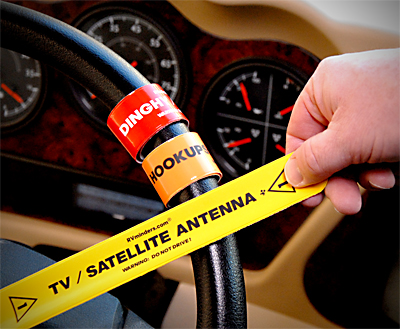
 Camping in an RV is many things, but no one ever said it was always easy. (Or if they did, they probably changed their tune shortly thereafter.)
Camping in an RV is many things, but no one ever said it was always easy. (Or if they did, they probably changed their tune shortly thereafter.)
Although running a rig is far from rocket science, there are quite a few important systems you need to master before setting out on the road… which means there are a whole lot of mistakes ripe for the making. It’s also easy to approach RV travel itself in a slightly misguided fashion — camping in an RV is quite different from other means of transportation and vacation you might be used to, and you’ll need to adjust your habits and expectations for the best results.
But learning to deal with challenges is an important aspect of any worthy adventure. And if you ask anyone who’s been on the road with their RV for an appreciable length of time, you’ll likely find that most of us have “been there, done that” — sometimes in spectacularly embarrassing style.
RV Camping Tips
Luckily, you get to learn from our example, instead of figuring it out the hard way. Here are five things you should never do with your camper, and a few RV tips and hacks so you can get started with camping the right way.
1. Don’t… touch that steering wheel without conducting a thorough walkaround.

If there’s one mistake beginners and veteran campers both make regularly, it’s this one. And driving away from camp without checking and double-checking everything can lead to some expensive — and face-palm-worthy — damages.
For instance, you might end up catching your satellite antenna on a low-hanging branch or dragging your sewer hose down the highway. And don’t even get me started on how dangerous your patio awning can become if it’s not stowed away properly before you leave!
(Do… find ways to remind yourself to double-check everything, whether it’s your third camping trip or three-hundredth.)
Whether you’re a full timer living on the road or a family of beginners in your first-time RV rental, doing a walkaround every single time you decide to move your rig is imperative — so much so, it’s best not to rely on memory alone.
Make a dedicated checklist and hang it in a conspicuous location so you won’t forget to take a second look at everything before you start your engine. You could also invest in RVminders, a brilliant, “why didn’t I think of that?” invention that will ensure you never drive away from camp without conducting thorough checks ever again. (Psst — this is especially important if your RV is a travel trailer, which has a few more moving parts and important connections to consider before setting off down the road!)
RV Travel Tips
There are a few travel mistakes it’s easy to make whether it’s your first time RV camping or your hundredth. Here are some tips and ideas to help you avoid these common inconveniences and errors.
2. Don’t… plan every single second of your upcoming camping trip, down to the rest stops.

Calling all type A personalities! It’s not just me, right?
If you’re the type to color-code your to-do list and schedule every day down to the minute at home, you’ll find approaching your RV vacation with this attitude will come back to bite you. Trust me: I’ve done it, time and again.
The road has a way of presenting us with a series of surprises, some of which make us sigh but many more of which make us smile. That’s why it’s important to build flexibility into your plans — if you’re stressed out about keeping up with your rigid itinerary, you might find you miss out on some of the very best, most serendipitous parts of RV camping.
(Do… make reservations for campsites if you’re traveling to popular areas during extremely busy travel times, like holiday weekends during the summer.)
One exception to this rule, however: If you’re traveling during popular seasons, or doing lengthy, cross country or otherwise extended RV trips, you may want to make some reservations ahead of time, at least for the weekends. Otherwise, you could find yourself camped out at the Walmart parking lot outside of the National Park entrance!
3. Don’t… overpack.

Just because your rig has room to store all the things doesn’t mean you should actually do so, even if it is super tempting. After years on the road, I still routinely overpack, no matter how I’m traveling… and an RV has all those cabinets and cubbies just begging to be filled!
But if you cram extra clothing, food, supplies, and gear into every square inch of your RV, you’ll soon find your comfortable home away from home has transformed into a claustrophobic dungeon.
So when it’s time to pack up, use your RV as an opportunity to learn a lesson in living minimalistically. If you don’t regularly wear an outfit at home, how likely is it that you’ll need it out on the road? Do you really regularly use two different kinds of moisturizer? A good rule of thumb I’ve found is that if you find yourself using the words “just in case,” you can likely do without it. Plus, if worst comes to absolute worst, you can always purchase whatever you left behind at your destination.
(Do… take advantage of your RV’s on-board kitchen and sleeping facilities to help you save money.)
Now, although overpacking is a danger, it would be equally silly not to travel with RV-specific essentials. And when it comes to packing an RV, there are certain necessities you might not think of with other modes of travel — things like linens, towels, dishes, and cookware. These items are what allow you to take advantage of your RV’s onboard amenities, which help you save money on hotel accommodations or restaurant meal prices. So although you don’t want to bring everything along for the ride, don’t leave home without making sure you’re covered when it comes to the basics!
Cheap RV Living Tips
Think RVing is cheap? Well, it can be… but only if you approach it the right way.
4. Don’t… assume RVing will automatically save you money on travel.

If you’ve got a big family or even if you’re just a solo traveler, RVing can look like the most frugal travel option at first glance. You don’t have to pay for hotels, for one thing, and you even have tons of entertainment options right there along with you, free of charge.
But don’t forget that RVs also take up lots of gas, and campground fees aren’t always as inexpensive as you might imagine. At plush, inclusive, resort-style campgrounds, you might be paying as much as $75 per night — that’s almost as much as a cheap hotel room!
Do… take advantage of the ways RVs are set up to help you lower costs.
Of course, RVing can still be a frugal way to travel, if you take advantage of the features that make it so. For one thing, make good use of your kitchen, which is one of the best ways to save money on the normal travel cost of eating out all the time. You can also find free and nearly-free camping accommodations if you do your research. Get in touch with the Bureau of Land Management and read up on boondocking!
RV Travel Tips for Seniors
There are some special considerations to keep in mind if you’ve got a few more years under your belt than some of us. (It’s not a bad thing — it’s a mark of experience!)
5. Don’t… drop everything and retire in an RV if you’ve never even rented one before.

Retiring in an RV is one of the most steadfast cultural stereotypes, and for good reason. Downsizing to a mobile home can give seniors an affordable new lease on life during their retirement, not to mention the ability to take those wild adventures so many of us somehow don’t find time for in our youth.
But simply hitting the road without doing any research is a recipe for disaster. So many things about living in an RV are different than in a foundation-built house. For instance, you have to learn how to aggressively conserve water when you’re not hooked up to a city source, and there’s a whole series of preparations you need to make if you’ll be camping in cold weather. Especially if you’re a little bit older, it’s important to inform yourself before you make the leap.
Do… prepare yourself for the road by doing lots of research and trying out the lifestyle first.
There’s no such thing as too much knowledge, especially when you’re considering making a major life change. Take advantage of the opportunity to rent a few different models before you buy a rig of your own, so you can get a feel for what setup works best for you. You can also take time to think about where you’d like to spend the majority of your retirement, or what your annual travel pattern will look like if you plan to stay on the move.
We hope these RV camping tips will help you take on the road with confidence and success… but don’t be mistaken. You’ll doubtless run into an error or two of your own, no matter how well you prepare.
But that’s okay — it’s all part of the camping journey! Just make sure you share your experience with the rest of us once you figure out the best way to take care of it.
